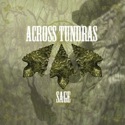
Across Tundras
Sage
Neurot Recordings
Just when you thought that Cormac McCarthy best captured the decline of the old West in All the Pretty Horses, imagine blasting this story into the desert plains of a desolate, post-apocalyptic wasteland. And so begins another journey into the apocalyptic wastelands by the Nashville prog-metal power trio, Across Tundras with their latest release, Sage. While the band’s signing with Neurot Recordings is new, their sound remains true to their other works – driving rhythms, over-reverbed distorted guitars, and a heavy bass backbeat harkens back to the prog-rock bands of the 70s: Pink Floyd with occasional hints of Black Sabbath.
The opening track, “In the Name of River Grand,” paints the song-scape of apocalyptic desolation with the occasional western-tinged breaks that basically lays out the theme of the entire album. Hijo de Desierto (“Son of the Desert”) seems to drop me off in the hostile Mojave to fend for myself with an almost empty rusty canteen, desperately pining for cool, clear, water.
The band’s clear stretch into the mainstream is on “Buried Arrows.” Lead singer Tanner Olson’s voice is wonderfully complemented with harmonies from Lilly Hiatt, daughter of the great country-folk songwriter John Hiatt. The catchy country-twinged fast breaks in the song that are reminiscent of Loretta Lynn or June Carter clearly makes this song more inviting to those new to the band’s style.
By the middle of the album, the dark rhythmic shuffle begins to get old. The distortion gets too muddy and the over-reverberation in almost all of their songs creates a wall of sound that pushes away the listener wondering what they’re getting at rather than pulling them into their world. “Mean Season Movin’ On” is filled with great guitar passages and explosive breaks of musical rage. Unfortunately, I would have liked this song, as well as on other tracks like “Tchulu Junction,” to have a wider dynamic range. That’s a shame because I suspect that this band plays so much better live than the recording. The final track, “Shunka Sapa,” is an instrumental opus that leaves one with a sense of hope. The driving rhythms from drummer Nathan Rose pulls us out of the drudges of desolation. Shunka Sapa is a reference to an old Lakota/Sioux Indian myth. The dog, Shunka Sapa, basically saves the world by stopping a porcupine quilt from being complete, signifying the end of the world.
And yet, this last track, along with the entire album, leaves me with both resignation and comfort in knowing that amidst a festering post-nuclear war, there’s always some will to survive – a fitting ending to the album’s theme.
What I love most about this band is their selflessness in getting their music out for the sake of sharing. Yes, they signed on with Neurot, but all of their previous albums and home recordings are freely available for their fans on http://acrosstundras.bandcamp.com. It’s no wonder why this band will always have a loyal fan base through the end of their days.
Across Tundras: http://www.neurotrecordings.com/artists/acrosstundras/acrosstundras.php












